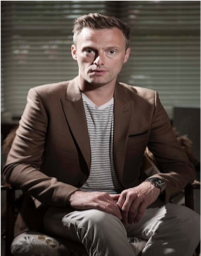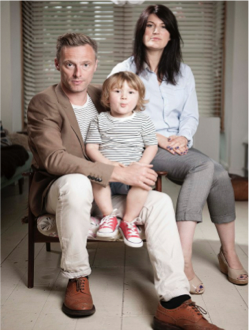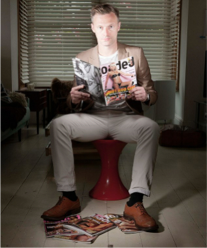By ex-lads' mag editor MARTIN DAUBNEY
The moment I knew internet pornography had cast its dark shadow over the lives of millions of ordinary British teenagers will live with me for ever.
I was sitting in the smart drama hall of a specialist sports college in the North of England with a fantastic reputation. Before me were a group of 20 boys and girls, aged 13-14. Largely white, working class children, they were well turned-out, polite, giggly and shy.
As the presenter of a Channel 4 documentary called Porn On The Brain, airing next Monday at 10pm, I'd been invited to sit in on a forward-thinking class led by sex education consultant Jonny Hunt, who is regularly asked into schools to discuss sex and relationships. To establish what these kids knew about sex - including pornography - he had asked the children to write an A-Z list of the sexual terms they knew, no matter how extreme.
Most of these children had just hit puberty and some were clearly still children: wide-eyed, nervous, with high-pitched voices.
Some of the girls were beginning their first forays into make-up. Several wore braces on their teeth. Everybody was smartly turned out in school uniform, and the most anti-authority statement in the room was a tie worn deliberately short. A One Direction pencil case lay on a desk. These were clearly good children, from good homes. So far, so very, very ordinary.
But when Jonny pinned their lists on the board, it turned out that the children's extensive knowledge of porn terms was not only startling, it superseded that of every adult in the room - including the sex education consultant himself.
Martin was shocked by what the teenagers said 'Nugget, what's that?' asked Jonny. 'A nugget is a girl who has no arms or legs and has sex in a porno movie,' chortled one young, pimply boy, to an outburst of embarrassed laughter from some, and outright revulsion from others. The adults in attendance were incredulous at the thought that not only did this kind of porn exist, but that a 14-year-old boy may have actually watched it.
But the more mundane answers were just as shocking. For example, the first word every single boy and girl in the group put on their list was 'anal'. When questioned, they had all - every child in a class of 20 - seen sodomy acted out in porn videos. I was stunned they even knew about it - I certainly hadn't heard of it at that age - let alone had watched it and as a result may even have wanted to try it.
 One 15-year-old girl said, 'Boys expect porn sex in real life'. And one boy - to choruses of approval - spoke of his revulsion for pubic hair, which he called a 'gorilla'. When Jonny pointed out that pubic hair was normal in real life, the boys scoffed, but some of the girls were angry that the boys' template of what to expect from real girls had clearly already been set by porn.
One 15-year-old girl said, 'Boys expect porn sex in real life'. And one boy - to choruses of approval - spoke of his revulsion for pubic hair, which he called a 'gorilla'. When Jonny pointed out that pubic hair was normal in real life, the boys scoffed, but some of the girls were angry that the boys' template of what to expect from real girls had clearly already been set by porn.
By the end of the hour-long class - and three others that followed with other children - I was profoundly saddened by what I had witnessed. While teenage boys will always be fascinated by, and curious about, sex, what's now considered 'normal' by under-18s is an entirely distorted view of intercourse and the way relationships should be conducted.
It seemed as if the children's entire expectation of sex had been defined by what they see in online porn. The conversation was horrifying enough, yet there was worse to come.
In the playground, I interviewed a brave group of seven bright boys and girls aged 14-15 to ascertain in more detail what online porn they had witnessed.
One boy calmly recalled watching a scene too graphic to describe in a family newspaper, but which had involved an animal. 'You're watching bestiality?' I asked. 'That's illegal. Where are you getting this stuff from?' 'Facebook,' the boy said. 'It just pops up whether you want it or not, sometimes via advertisements. You don't have any control over it.'
A girl added, 'On Facebook, you just scroll down and it's there. If any of your friends like it, it comes up on your home page.' These kids were balanced, smart and savvy. They were the most academically gifted and sporting in the school. They came from ordinary, hard-working households. This was not 'Broken Britain'.
Some were clearly shocked by what they had seen on the internet. 'I find it dirty and disturbing,' said one 15-year-old boy. 'I try not to look at it, but people just keep sending it to each other. They email disgusting links to each other's mobile phones to shock.'
One girl put her head in her hands and said, 'It's just gross'.
It's horrifying enough for parents to know that children can get porn via the internet. But to think they get it from Facebook - the social media currency that has become a universal must-have for teenagers globally - will strike terror into their hearts.

Documentary investigates what effect online porn has on teens
After leaving Loaded MartinI agonised that they may have switched a generation onto explicit porn
I asked the teenagers: 'On a scale of one to ten, how likely would you say it is that boys and girls your age are watching porn online?' The reply was a chorus of tens, nines and one eight.
When I asked the children if there were parental controls on the internet at home, they all said no, their parents trusted them. They all admitted their parents had no idea what they were watching, and would be shocked if they did know. What I saw at the school was awful, but sadly not unusual.
The findings were backed up in a survey of 80 boys and girls aged 12-16, commissioned for the TV show.
It proves the vast majority of UK teens have seen sexual imagery online, or pornographic films.
According to the survey, the boys appear largely happy about watching porn - and were twice as likely as girls to do so - but the girls are significantly more confused, angry and frightened by online sexual imagery. The more they see, the stronger they feel. But what impact is this steady diet of online depravity having on the attitudes of boys and girls towards real life relationships, and on their self-esteem?
Could it even have a wider impact on their lives, blighting their ability to function in the world, get good qualifications and jobs? What I discovered left me truly shocked and saddened. He wanted to know how to protect his son
You might be surprised. After all, from 2003-2010 I edited lad's magazine Loaded.
With its frequent nudity and lewd photo spreads, I'd long been accused of being a soft pornographer, and after leaving Loaded I agonised that my magazine may have switched a generation onto more explicit online porn. In the documentary I set out on a journey to answer the question: is porn harmless, or is it damaging lives?
My interest was deeply personal, too, as my own beautiful little boy, Sonny, is now four. Even though he has only just started primary school, the Children's Commissioner estimates boys as young as ten are now being exposed to online porn.
I wanted to know what I could do to protect my own son from a seemingly inevitable exposure to hardcore material in just a few years' time.
I used to be sceptical that porn was as damaging a force as the headlines and David Cameron - who recently said it was 'corroding childhood' - suggest. In the past I'd even defended pornography in university debates, on TV and on radio. I claimed it was our freedom of choice to watch it and said it could actually help add to adult relationships.
But what I saw during the making of the film changed my opinion of pornography forever.
The true stories of boys I met whose lives had been totally taken over by porn not only moved me to tears but also made me incredibly angry that this is happening to our children. And the looks of revulsion on those poor girl's faces in the playground enraged me. I feel as if an entire generation's sexuality has been hijacked by grotesque online porn.
To find out what porn is doing to young men, and the girls they have relationships with, we spoke to them via online forums and discovered that there were many young lives seriously blighted by an excessive, unhealthy relationship with pornography that can begin when they are as young as 12. We learned that some had lost their jobs, others had broken relationships, failed exams, or got into serious debt through using porn.
'When you interview young women about their experiences of sex, you see an increased level of violence: rough, violent sex. That is directly because of porn, as young boys are getting their sexual cues from men in porn who are acting as if they're sexual psychopaths'
Take the 19-year-old man I got to know. He was handsome, articulate and in full-time employment as an apprentice electrician. But his life was dominated by his porn habit.
'Every bit of spare time I have is spent watching porn,' he says. 'It is extreme. I can't hold down a relationship for longer than three weeks. I want porn sex with real girls, but sex with them just isn't as good as the porn.' Having established, like the recent Children's Commissioner report, that 'basically, porn is everywhere', we set out to discover what all this porn was doing to their brains. Was it having any effect at all? Could it be addictive?
We found Dr Valerie Voon, a neuroscientist at Cambridge University and a global authority on addiction. Then, in the first study of its kind, we recruited 19 heavy porn users who felt their habit was out of control and had Dr Voon examine their brain activity as they watched, among other things, hardcore porn. She showed them a variety of images, both stills and videos.
These ranged from images known to excite all men, such as bundles of £50 notes and extreme sports in action, to mundane landscapes and wallpapers - all inter-spliced with hardcore porn videos, plus pictures of both clothed and naked women.
The ways in which their brains responded to this diverse imagery were compared with the responses of a group of healthy volunteers. She was interested in a particular brain region called the ventral striatum - the 'reward centre' - where our sense of pleasure is produced. This is one of the areas where an addict will show a heightened response to visual representations of their addiction - whether it's a syringe or a bottle of vodka.
'Letting our children consume it freely via the internet is like leaving heroin lying around the house'
What we discovered was a revelation. When shown porn, the reward centre of normal volunteers barely reacted, but that of the compulsive porn users lit up like a Christmas tree.
The compulsive porn users' brains showed clear parallels with those with substance addictions. Everybody on the project was astounded, even Dr Voon, who admitted she had been 'sceptical and ambivalent' about the study at the outset.
If porn does have the insidious power to be addictive, then letting our children consume it freely via the internet is like leaving heroin lying around the house, or handing out vodka at the school gates. And this toxic effect is filtering down directly into young girls' lives.
The most shocking testament came from Professor Gail Dines. Regarded as the world's leading anti-pornography campaigner, she has interviewed thousands of men and women about sex and pornography. 'Pornography is sexually traumatising an entire generation of boys.'
By talking with sexual addiction experts such as Professor John E Grant of the University of Chicago, Dr Paula Hall, the UK's top sex addiction therapist, and Professor Matt Field from the University of Liverpool, we learned that the teenage brain is especially vulnerable to addiction.
The brain's reward centre is fully developed by the time we're teenagers, but the part of the brain that regulates our urges - the pre-frontal cortex - isn't fully developed until our mid-20s. The brains of teenagers are not wired to say 'stop', they are wired to want more. The implications of this study are profoundly troubling.
So who is going to take on the responsibility for protecting our children until they are old enough to do it for themselves? Can we rely on schools? It strikes me that the current sex education system in the UK - where schools are obliged only to teach the basics of reproduction and the perils of sex, which they can opt out of anyway - is hopelessly outdated.
In the internet age, our children are turning to online porn for an alternative sex education - the worst place they can go. The Mail claimed a victory in July when David Cameron announced that by the end of 2014 all 19 million UK homes currently connected to the internet will be contacted by service providers and told they must say whether family friendly filters that block all porn sites should be switched on or off.
But our TV show proved that determined children will always find a way around online blocks. Ultimately, the responsibility lies with us, the parents. The age of innocence is over. Like many parents, I fear that my boy's childhood could be taken away by pornography. So we have to fight back.
We need to get tech-savvy, and as toe-curling as it seems, we are the first generation that will have to talk to our children about porn. We have to tell our kids that pornographic sex is fake and real sex is about love, not lust.
By talking to them, they stand a chance. If we stick our head in the sand, we are fooling only ourselves.




Leave a Reply
You must be logged in to post a comment.